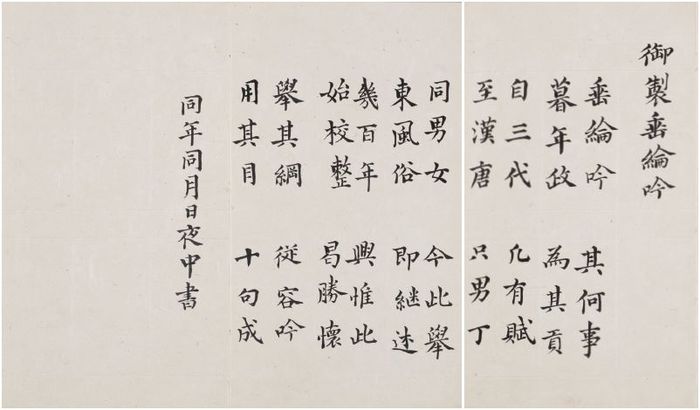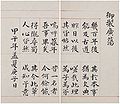"(Translation) 御製垂綸吟"의 두 판 사이의 차이
(→Student 1 : (Kanghun Ahn, Hu Jing, King Kwong Wong, Zhijun Ren)) |
(→Student 1 : (Kanghun Ahn, Hu Jing, King Kwong Wong, Zhijun Ren)) |
||
| 73번째 줄: | 73번째 줄: | ||
---- | ---- | ||
# Three Dynasties refer to the Xia, Shang, and Zhou dynasties | # Three Dynasties refer to the Xia, Shang, and Zhou dynasties | ||
| − | # Koreans refer their own country as either Haedong (East of the Sea) or | + | # Koreans refer their own country as either Haedong (East of the Sea) or Tongguk (the Eastern Country). |
*Discussion Questions: | *Discussion Questions: | ||
2017년 7월 6일 (목) 19:28 판
| Primary Source | ||
|---|---|---|
 |
Title | |
| English | ||
| Chinese | 御製垂綸吟 | |
| Korean(RR) | 어제수윤음(Eoje suyuneum) | |
| Text Details | ||
| Genre | Royal Documents | |
| Type | ||
| Author(s) | King Yeongjo | |
| Year | 1774 | |
| Source | ||
| Key Concepts | King Yeongjo, | |
| Translation Info | ||
| Translator(s) | Participants of 2017 Summer Hanmun Workshop (Advanced Translation Group) | |
| Editor(s) | ||
| Year | 2017 | |
목차
- 1 Introduction
- 2 Original Script
- 3 Translation
- 3.1 Student 1 : (Kanghun Ahn, Hu Jing, King Kwong Wong, Zhijun Ren)
- 3.2 Student 2 : (Write your name)
- 3.3 Student 3 : (Write your name)
- 3.4 Student 4 : (Write your name)
- 3.5 Student 5 : (Write your name)
- 3.6 Student 6 : (Write your name)
- 3.7 Student 7 : (Write your name)
- 3.8 Student 8 : (Write your name)
- 3.9 Student 9 : (Write your name)
- 3.10 Student 10 : (Write your name)
- 3.11 Student 11 : (Write your name)
- 3.12 Student 12 : (Write your name)
- 3.13 Student 13 : (Write your name)
- 3.14 Student 14 : (Write your name)
- 4 Further Readings
Introduction
Original Script
| Classical Chinese | English |
|---|---|
|
御製垂綸吟 垂綸吟 暮年政 其何事 爲其貢 |
(translation) |
Translation
Student 1 : (Kanghun Ahn, Hu Jing, King Kwong Wong, Zhijun Ren)
御製垂綸吟 Royal Instruction of King Yǒngjo to be Handed Down to Future Generations
垂綸吟 暮年政 [Leaving a legacy for future generations,] I write down this instruction during the last years of my reign.
其何事 爲其貢 What is this about? It is about the taxation policy.
自三代 至漢唐 From the Three Dynasties*1 till the Han and Tang periods,
凡有賦 只男丁 Every taxation policy had only affected male adults.
同男女 東風俗 [On the contrary,] Taxing equally both men and women is a practice of the East.*2
今此舉 即繼述 Now this act is a continuation of the practices [of the Han and Tang].
幾百年 始校整 After several hundreds of years, [this inconsistency with the Han and Tang practices] begin to be rectified.
與惟此 曷勝懷 Only through this way that my idea could be fulfilled.
舉其綱 用其目 Bringing up the essence and employing the details,
從容吟 十句成 I calmly complete this instruction in ten sentences.
同年同月日夜中書 Written in the middle of the night in the same year, month, and day
- Three Dynasties refer to the Xia, Shang, and Zhou dynasties
- Koreans refer their own country as either Haedong (East of the Sea) or Tongguk (the Eastern Country).
- Discussion Questions:
Student 2 : (Write your name)
- Discussion Questions:
Student 3 : (Write your name)
- Discussion Questions:
Student 4 : (Write your name)
- Discussion Questions:
Student 5 : (Write your name)
- Discussion Questions:
Student 6 : (Write your name)
- Discussion Questions:
Student 7 : (Write your name)
- Discussion Questions:
Student 8 : (Write your name)
- Discussion Questions:
Student 9 : (Write your name)
- Discussion Questions:
Student 10 : (Write your name)
- Discussion Questions:
Student 11 : (Write your name)
- Discussion Questions:
Student 12 : (Write your name)
- Discussion Questions:
Student 13 : (Write your name)
- Discussion Questions:
Student 14 : (Write your name)
- Discussion Questions:




